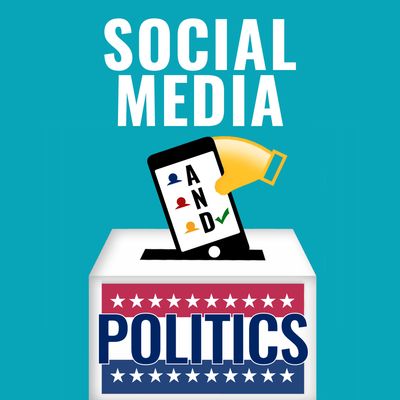Social Media and Politics is a podcast bringing you innovative, first-hand insights into how social media is changing the political game. Subscribe for interviews and analysis with politicians, academics, and leading digital strategists to get their take on how social media influences the ways we engage with politics and democracy. Social Media and Politics is hosted by Michael Bossetta, political scientist at Lund University. Check out the podcast's official website: https://socialmediaandpolitics.org.
https://socialmediaandpolitics.org
Gesamtlänge aller Episoden: 5 days 14 hours
episode 153: Data-driven Campaigning with Polling and Focus Groups in American Elections, with Zac McCrary
Zac McCrary, Partner at Impact Research and host of the Pro Politics podcast, shares his insights on how American campaigns leverage polling and focus groups to craft a winning message. We discuss the upcoming 2022 US midterm elections, the (still) dominant role of television in political advertising, how social media fits into the picture, and how smart phones have changed polling into a multimodal endeavor.
episode 152: Cross-Platform Visual Campaigning on Social Media: Emotions in Political Candidates' Facebook and Instagram Images
In this episode, it's just me! I present a recently published study, co-authored with Rasmus Schmøkel and published in Political Communication, that analyzes US Presidential campaigns' emotion expression across Facebook and Instagram. I'll explain the theoretical backdrop of the study, give an overview of the state-of-the-art on visual political communication, and communicate the study's methods and key results. Hope you enjoy this one-on-one episode!
episode 151: Data Journalism to Report Social Media and Politics, with Aleszu Bajak
Aleszu Bajak, Senior Data Reporter at USA Today, discusses his reporting on social media and politics using computational methods. We talk about the types of data that data journalists are working with, how they acquire it (e.g., Freedom of Information Requests), and how they approach reporting results in a way that tells an engaging story...
episode 150: Swedish Elections 2022, Political Communication, and Social Media, with Dr. Nils Gustafsson
Dr. Nils Gustafsson, Senior Lecturer of Strategic Communication at Lund University, discusses the run-up to the 2022 Swedish Elections and then findings from his research. First, we chat about the main political issues that Swedes are voting on, as well as how political parties and party leaders are digital campaigning on social media. Then, Dr. Gustafsson shares findings from three of his research projects...
episode 149: Social Media, Information Markets, and the Attention Economy, with Prof. Vincent Hendricks
Prof. Vincent Hendricks, Professor of Formal Philosophy at the University of Copenhagen, discusses his new book The Ministry of Truth: Big Tech's Influence over Facts, Feelings, and Fictions. Prof. Hendricks shares how social media are like investment banks in the attention economy, how information is packaged and sold, and what Big Tech's growing influence on critical infrastructure means for politics and society.
episode 148: Machine Learning the Facebook URLs Dataset to Study News Credibility, with Dr. Tom Paskhalis
Dr. Tom Paskhalis, Assistant Professor in Political and Data Science at Trinity College Dublin, shares his research on applying machine learning to the Facebook URLs Dataset from Social Science One. The project develops a model to label whether a news domain is credible or not based on Facebook interactions data. We discuss the Facebook URLs dataset, what types of machine learning techniques were applied to it, and how the model performed across the US and EU countries.
episode 147: Anti-Immigration YouTube Videos: Tactics and Narratives, with Shauna Siggelkow
Shauna Siggelkow, Director of Digital Storytelling at Define American, discusses a new report on anti-immigration YouTube videos: 'Immigration will Destroy Us and Other Talking Points.' We break down the report, which identifies a network of viral YouTube videos promoting narratives associated with the Great Replacement Theory. Shauna also shares findings from experiments that test how different genres, animation styles, and messengers can effectively communicate political issues.
episode 146: Social Media Influencers and Politics, Environmental Behavior, and Covid Misinformation, with Dr. Desirée Schmuck
Dr. Desirée Schmuck, Assistant Professor at the Department of Mass Communication at KU Leuven, shares her research on social media influencers and their effects on users' political attitudes and behavior. We break down three of Dr. Schmuck's studies. The first focuses on how exposure to political influencer content affects young social media users' behavior, both in terms of formal electoral participation and environmental sustainability...
episode 145: Political Tech Incubators in American Digital Campaigning, with Eric Wilson
Eric Wilson, Managing Partner at Startup Caucus and Host of The Business of Politics Show, discusses political tech incubators and their emerging role in US digital campaigning. We chat about how the Republican and Democratic Party need different tech solutions for different campaigning styles, the need for start-up campaigning firms, and the potential impact of Web3 on future political campaigns.
episode 144: Technology Disruption, Democracy, and Principled Platform Regulation, with Prof. Lance Bennett
Prof. Lance Bennett, Professor Emeritus of Political Science and Communication at the University of Washington, discusses the types of principled values that should guide platform regulation. We reflect on the disruptive ethos of tech companies and what that means for democracy. We also discuss theories of capitalism, recent changes in data privacy and third-party tracking, as well as the connection between digital technologies and protest parties.
